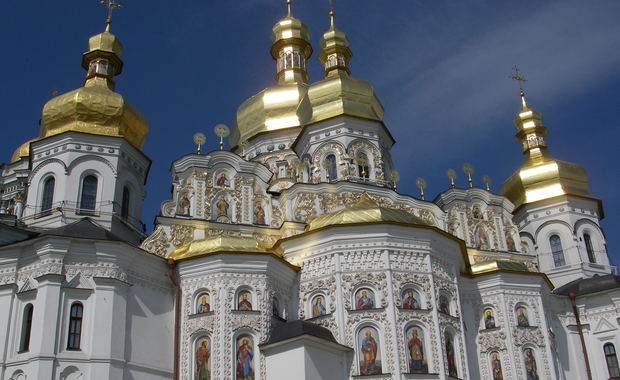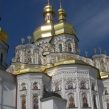
Russia’s Conflict Against Ukraine and the West: The Religious Dimension
Publication: Eurasia Daily Monitor Volume: 13 Issue: 53
By:

The conflict Russia is waging against Ukraine has, from the very beginning, had many different dimensions. Currently, it is increasingly assuming the narrative and form of an existential conflict between two antagonistic civilizations with competing ideologies, cultures and religions. The February 12 meeting in Havana, between the Roman Pontiff, Pope Francis, and Russian Patriarch Kirill, is a case in point. The mutually exclusive Ukrainian versus Russian interpretations of that meeting certainly illustrate the way religious rhetoric is being used by the Kremlin against the Ukrainian nation and state—and the West as a whole.
Commentary in Russia and Ukraine on the February meeting between the two religious leaders continued right through until March. Russian media were pointedly enthusiastic, declaring a “breakthrough” in the history of inter-confessional relations (1tv.ru, TASS, February 14). While Russian Orthodox Church (ROC) officials made no secret of their deep satisfaction with the results of the “historic summit” (Patriarchia.ru, February 24).
Furthermore, when speaking about the meeting, Archimandrite Melchisedech, the press secretary of the Synodal Department for Monasteries and Monasticism and a superior at two Moscow parish churches, was apparently trying to convince his parishioners that the Pontiff had allegedly repented the sins of the Catholic Church and was eager to convert to Orthodoxy. “Rumor has it that the Pope is sorry that Catholics failed to preserve the purity of Orthodoxy, and he is about to return to the fold of the Holy Orthodox Church,” Melchisedech claimed (Ostro.org, February 24). According to him, the Pope was penitent for blessing euthanasia, gay parades and same-sex marriages.
Meanwhile, both Ukrainian clergy and the general public expressed disappointed or even shock by the wording of the joint declaration released following Francis and Kirill’s talks (Patriarchia.ru, February 13)—specifically paragraphs 25, 26 and 27 concerning the situation in Ukraine. According to the official statement of the Ukrainian Orthodox Church of the Kyivan Patriarchate, paragraph 25 of the joint declaration does not take into consideration the opinion of the Ukrainian Greek Catholic (Uniate) Church; paragraph 26 totally ignores the Russian armed, political, economic and informational aggression against Ukraine as the key reason of the war in Donbas; and paragraph 27 neglects the violation of religious canons by the Moscow Patriarchate in the 17th century as the background for the split in the Orthodox Church. In the opinion of the Kyiv Patriarchate, those paragraphs are written “in the worst traditions of Soviet diplomacy, with numerous ambiguities, biased views and unfounded assertions.” Alluding to the 1938 Munich accords that splintered Czechoslovakia, the Kyiv Patriarchate declared that it wholly rejects any decisions regarding Ukraine or its religious and public life made in the absence of Ukrainian representatives or while ignoring their opinion (Cerkva.info, February 15).
Lubomyr Husar, the Major Archeparch Emeritus of the Ukrainian Greek Catholic Church, believes that the wording of the joint declaration is a demonstration of the dramatic psychological effect Moscow has had on the Vatican and the West in general. According to him, Russia has built an extremely effective propaganda machine and, for decades, has used it to shape the opinion of Western publics to be more accepting of Russian narratives. “I am very sorry that the Pope has fallen a victim to it. I am not aware of all details, but as far as I heard there were people, who had in some way outplayed the Pope,” Husar claimed. “The Pope has been eager to establish peaceful contacts with Russia and the Patriarch, but I guess he had been misinformed,” the Ukrainian Greek Catholic clergyman said (Apostrophe.com.ua, March 7).
Ukrainian commentators also questioned the ROC’s relative global importance versus the Russian narrative claiming the Russian Church to be a comparable peer of the Roman Catholic Church. Thus, Yakov Krotov, a Moscow-based priest of the Ukrainian Autocephalous Orthodox Church, described the summit as a meeting between an elephant and a mouse. “There are one billion [Catholic] believers on one side and 100 million at most but, in reality, barely 10 million [Russian Orthodox] on the other side,” he wrote (Facebook.com/james.krotov, February 12).
It is, indeed, extremely difficult to properly quantify the Russian Orthodox Church’s believers, since the size and rank of the Russian Church in the Orthodox World is based mainly on the number of parishes under its jurisdiction. As the world’s largest Orthodox Church, the Moscow Patriarchate boasts more than 30,000 parishes. However, only about half of them are based in the Russian Federation itself. For comparison, there are a total of 18,204 Orthodox parishes in Ukraine (as of January 1, 2015), including 12,241 of the Ukrainian Orthodox Church–Moscow Patriarchate (a self-governing Church of the ROC in Ukraine), 4,738 of the Ukrainian Orthodox Church of the Kyivan Patriarchate, and 1,225 of the Ukrainian Autocephalous Orthodox Church (Risu.org.ua, May 30, 2015).
However, particularly since the start of the Russian war against Ukraine, increasingly more Ukrainians have been affiliating themselves with the Kyiv Patriarchate. According to some polls, they now outnumber the local Moscow Patriarchate’s faithful, reaching a quarter of the nation’s total population, or more than 10 million people. As a result, many parishes in Ukraine have changed their jurisdiction from the Moscow to Kyiv Patriarchate (Ridna.ua, December 12, 2015).
The Russian Church has been doing everything in its power to prevent the possible unification of the Ukrainian Orthodox Churches of Moscow and Kyiv Patriarchates, seeing it as the main threat to its hegemony over Eastern Orthodoxy. Likewise, the ROC has actively tried to keep the two Orthodox Churches in Ukraine not under its control from coming together. The merger of the Kyiv Patriarchate with the Ukrainian Autocephalous Orthodox Church, which has been attempted at least five times since Ukraine’s independence in 1991, failed each time. Last year, the two sides were closer than ever to achieving integration. But through its back-channel overtures to the Autocephalous Church’s leaders, the Moscow Patriarchate was again able to block the process (Expres.ua, July 22, 2015).
Nevertheless, Yakov Krotov argues that the Moscow Patriarchate—like the Russian state itself—is entirely dependent on Russian hydrocarbon sales. But as those revenues continue to dwindle due to chronically low oil prices, the Russian Orthodox Church and its reach in Ukraine is bound to continue to weaken as well (Facebook.com/james.krotov, February 12).




